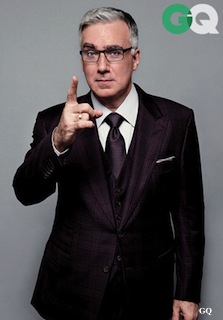
Keith Olbermann's return to ESPN was one of the more startling media developments in recent years. Landing new gigs isn't really the hard part for Olbermann, who has made the rounds throughout the cable universe in the past three decades. But stormy exits, along with outrage and controversy, have been part of the package. GQ's deputy editor Michael Hainey sat down for an interview with Olbermann during lunch at an Upper East Side restaurant and wrote that "despite the reputation he's gained over the past decades, in person he's friendly and open." Here are some highlights:
GQ: You've spoken in the past of being bullied in grammar school. Do you feel at a certain point you became the bully? That you crossed over?
KEITH OLBERMANN: No. Because a bully is fighting out of a need to dominate. And is usually unwilling to take the consequences.
GQ: Was being bullied a formative moment?
KEITH OLBERMANN: Well, here's the background to it. I was a big kid for my age and well advanced intellectually, to the point where I was skipped in the first grade. When another kid did not operate at my level of response --"Steven? Hey, Steven? Steven?" -- I'd hit him to get his attention. And my folks enrolled me in a judo class to work out my aggressions. So I was like a potential... Bully is too strong a term. It was frustration. I had potential over-aggressive problems.
GQ: Do you enjoy confronting power?
KEITH OLBERMANN: If the power you are facing is a bullying power, it is likely far less strong than you perceive it to be. If you roll up your sleeves and make the appropriate sounds, they will probably fold. In the political world, I found that to be alarmingly and, for the sake of the democracy, disturbingly true.
GQ: When do you think anger became the base level of this country?
KEITH OLBERMANN: Richard Belzer said that [since the 1936 election] Republicans just got angrier and angrier. And several people who had their own inner anger took that and ran with it. I'm one of the people who liked to mock Rush Limbaugh, but we cannot overestimate his influence on the last thirty years of American political history. Largely because he didn't succeed in sports, he went into this thing that wasn't his primary thing and decided to let his rage go, and became a multibillionaire as a result of it.
Flash to '96, probably '95. I walk into SportsCenter, and he's standing in my way. "Hi, Keith! Rush Limbaugh! Big fan!" I said, "No offense, but is there a reason you're here?" He goes, "I finally convinced the guys to let me sit in on the football show. That's all I ever wanted. I'd trade everything I have right now to do that show or co-host SportsCenter with you. My God, this is it!" Seventeen years ago, he would have thrown it away if he had an opportunity to do sports for a living. It's one of those "He didn't get to be this, so he became Napoleon instead."
GQ: Do you have a favorite sports cliché?
KEITH OLBERMANN: "He's considered day-to-day." We are all day-to-day!
-- For the complete GQ Q&A with Keith Olbermann in which he makes references to Teddy Roosevelt, Life Of Brian and Bewitched star Elizabeth Montgomery, go to GQ.com.
More From GQ:
-- Best Suits Under $400
-- The 50 Best Things To Eat And Drink Right Now
-- 9 Things Every Man Should Have In His Pockets
-- The 6 Shoes That Will Last A Lifetime




